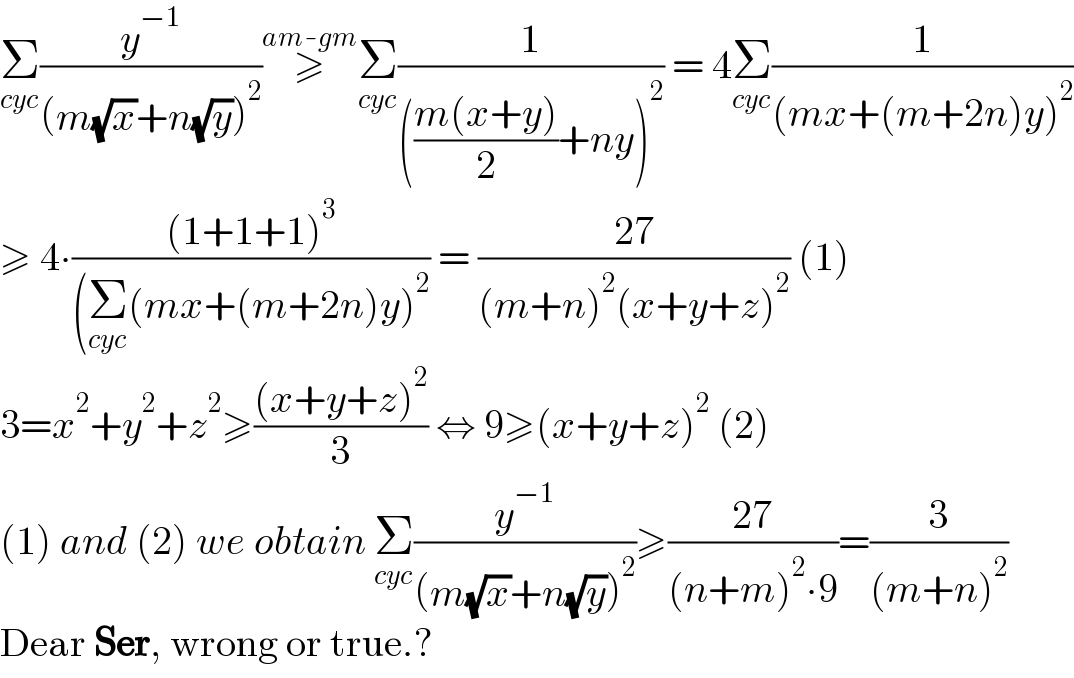Question Number 149870 by mathdanisur last updated on 07/Aug/21

$$\mathrm{if}\:\:\:\mathrm{x};\mathrm{y};\mathrm{z};\mathrm{m};\mathrm{n}\in\mathbb{R}^{+} \:\:\mathrm{then}: \\ $$$$\underset{\boldsymbol{\mathrm{cyc}}} {\sum}\:\frac{\mathrm{b}^{−\mathrm{1}} }{\left(\mathrm{m}\sqrt{\mathrm{x}}\:+\:\mathrm{n}\sqrt{\mathrm{y}}\right)^{\mathrm{2}} }\:\geqslant\:\frac{\mathrm{3}}{\left(\mathrm{m}\:+\:\mathrm{n}\right)^{\mathrm{2}} } \\ $$
Commented by mathdanisur last updated on 08/Aug/21

$$\mathrm{Sorry}\:\mathrm{dear}\:\boldsymbol{\mathrm{S}}\mathrm{er}… \\ $$$$\underset{\boldsymbol{\mathrm{cyc}}} {\sum}\:\frac{\boldsymbol{\mathrm{y}}^{−\mathrm{1}} }{\left(\boldsymbol{\mathrm{m}}\sqrt{\boldsymbol{\mathrm{x}}}\:+\:\boldsymbol{\mathrm{n}}\sqrt{\boldsymbol{\mathrm{y}}}\right)^{\mathrm{2}} }\:\geqslant\:\frac{\mathrm{3}}{\left(\boldsymbol{\mathrm{m}}\:+\:\boldsymbol{\mathrm{n}}\right)^{\mathrm{2}} } \\ $$
Commented by mathdanisur last updated on 08/Aug/21

$$\underset{{cyc}} {\sum}\frac{{y}^{−\mathrm{1}} }{\left({m}\sqrt{{x}}+{n}\sqrt{{y}}\right)^{\mathrm{2}} }\overset{{am}-{gm}} {\geqslant}\underset{{cyc}} {\sum}\frac{\mathrm{1}}{\left(\frac{{m}\left({x}+{y}\right)}{\mathrm{2}}+{ny}\right)^{\mathrm{2}} }\:=\:\mathrm{4}\underset{{cyc}} {\sum}\frac{\mathrm{1}}{\left({mx}+\left({m}+\mathrm{2}{n}\right){y}\right)^{\mathrm{2}} } \\ $$$$\geqslant\:\mathrm{4}\centerdot\frac{\left(\mathrm{1}+\mathrm{1}+\mathrm{1}\right)^{\mathrm{3}} }{\left(\underset{{cyc}} {\sum}\left({mx}+\left({m}+\mathrm{2}{n}\right){y}\right)^{\mathrm{2}} \right.}\:=\:\frac{\mathrm{27}}{\left({m}+{n}\right)^{\mathrm{2}} \left({x}+{y}+{z}\right)^{\mathrm{2}} }\:\left(\mathrm{1}\right) \\ $$$$\mathrm{3}={x}^{\mathrm{2}} +{y}^{\mathrm{2}} +{z}^{\mathrm{2}} \geqslant\frac{\left({x}+{y}+{z}\right)^{\mathrm{2}} }{\mathrm{3}}\:\Leftrightarrow\:\mathrm{9}\geqslant\left({x}+{y}+{z}\right)^{\mathrm{2}} \:\left(\mathrm{2}\right) \\ $$$$\left(\mathrm{1}\right)\:{and}\:\left(\mathrm{2}\right)\:{we}\:{obtain}\:\underset{{cyc}} {\sum}\frac{{y}^{−\mathrm{1}} }{\left({m}\sqrt{{x}}+{n}\sqrt{{y}}\right)^{\mathrm{2}} }\geqslant\frac{\mathrm{27}}{\left({n}+{m}\right)^{\mathrm{2}} \centerdot\mathrm{9}}=\frac{\mathrm{3}}{\left({m}+{n}\right)^{\mathrm{2}} } \\ $$$$\mathrm{Dear}\:\boldsymbol{\mathrm{Ser}},\:\mathrm{wrong}\:\mathrm{or}\:\mathrm{true}.? \\ $$
Commented by mathdanisur last updated on 08/Aug/21

$$\mathrm{Thank}\:\mathrm{you}\:\mathrm{very}\:\mathrm{much}\:\mathrm{dear}\:\boldsymbol{\mathrm{Ser}}… \\ $$
